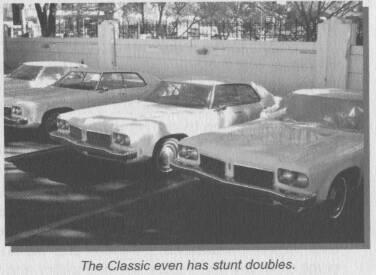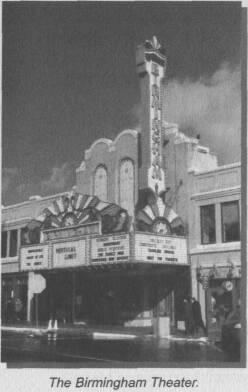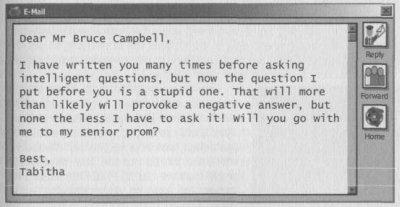If Chins Could Kill: Confessions of a B Movie Actor (9 page)
Read If Chins Could Kill: Confessions of a B Movie Actor Online
Authors: Bruce Campbell
Tags: #Autobiography, #United States, #General, #Biography & Autobiography, #Biography, #Entertainment & Performing Arts - General, #Entertainment & Performing Arts, #Actors, #Performing Arts, #Entertainment & Performing Arts - Actors & Actresses, #1958-, #History & Criticism, #Film & Video, #Bruce, #Motion picture actors and actr, #Film & Video - History & Criticism, #Campbell, #Motion picture actors and actresses - United States, #Film & Video - General, #Motion picture actors and actresses

Eventually, out of the need to film in a different law enforcement jurisdiction, we explored new territory. As suburban kids, the idea of venturing thirty miles into the heart of Detroit to film was intimidating, but we did so on several occasions. We never had any problems from the police in that city -- stopping a bunch of yahoos in ill-fitting suits was the
least
of their problems.
Detroit is the land of teamsters, so the chance to reenact the abduction of former boss James Hoffa seemed like a good idea. Filming at the actual restaurant only two weeks after his disappearance was not, however, and it got us kicked off the property in twenty minutes.
"YOU WILL NEVER KILL MY CLASSIC"
Sam Raimi's family owned a 1973 Oldsmobile Delta Royale. For some reason, it became the all-purpose car that appeared in almost every Super-8 film we ever made.
When Sam began to make feature films, he kept using it -- from
Evil Dead
in 1979 to his Kevin Costner film,
For Love of the Game,
twenty years later.
Sam began to adopt a strange attachment to this car and brazenly dubbed it "the Classic." My crappy car, an Opel Isuzu, had also been in several of our shorts, but Sam would only refer to it offhandedly as a "pseudo foreign sub-classic." The best any
other
car could hope for was "sub-classic."
David Goodman, a longtime friend of the Raimi family, offered his take on Sam's object of desire:
"I think he got laid for the first time in the Classic, that's why it's so important to him."
The Delta was everywhere -- aside from numerous Super-8s, it drove the kids to the
Evil Dead
cabin, engaged in a high-speed chase in
Crimewave,
absorbed the shock of Liam Neeson slamming into it in
Darkman
and became the "Deathcoaster" in
Army of Darkness.
Wouldn't this piece of crap ever die?
I wondered to myself. Not if Sam could help it. For
Evil Dead II,
Sam had it brought down from Michigan to North Carolina on the back of a flatbed truck because it no longer ran. By this time, Dave Goodman was the transportation coordinator and the car became the bane of his existence.
"It was just a pain in the ass. Sam needed specific things in the car to work because he had certain shots within the car that he needed and he would never bend. I said, 'Sam, you can't do it this way it's going to cost you this much money,' and he says, 'I don't care. I want it the way I want it.' It was almost like he was crazy about it."
As a result, our deal with Sam, starting with
Evil Dead II,
was this: anything over the amount of money in the budget to repair his car had to come from his pocket.
On
Crimewave
, I ordered the Classic to be killed. A rear screen projection sequence called for the chase cars to be mounted on sliding rails. In order to do this, the vehicle had to be stripped of excess weight. At the end of a long shooting day, the mechanic, Pat, approached me with a dilemma.
Pat: Hey, Bruce, I've got to prep one of the Deltas for tomorrow (there were several needed in the film) and the only one with the right interior is Sam's personal car.
I could barely contain my smile.
Bruce: Gut it, Pat.
Pat: Really? You sure?
Bruce: Sure I'm sure. The continuity has to be right, doesn't it?
With that, Pat proceeded to remove the engine, the transmission and he welded the wheels up in the wheel wells.
The next morning, Sam sauntered over to the car, now up on the rails, and began to direct Sheree, the lead actress being chased.
Sam: Okay Sheree, you're driving like mad, see, and you...
Sam's gaze shifted to the interior of the car -- to the creamy white,
original
interior.
Sam: Hey... hey, is this my...?
Instinctively, he turned to me.
Sam: Is this my car? Is this the Classic?
Bruce: Can't you tell?
Sam: You gutted my car! You tried to kill the Classic!
Bruce: No, Sam, I figured that for this important sequence, you'd want the only car that had the proper interior...
Knowing that I was bullshitting, Sam raised a finger at me.
Sam: Hard as you try, you will
never
kill the Classic...
God only knows how much Sam forked out over the years to keep this rusted hulk in front of the camera. I'd love to have an auto supplier checklist of every new part issued in the name of Sam Raimi.
Bruce: What percentage of that car is still original, Sam, like five percent?
Sam: No, there's more. The basic body and frame is still original.
Bruce:
And... ?
Sam: Well, okay the motor is not original. Most of the working engine parts are probably not original. The wheels are not original. Some of the upholstery is not original, but it's got the original dash, the steering wheel. The body has a lot of Bond-O, I will admit.
When asked where the Classic was now, Sam cagily responded, "In a warehouse somewhere in southern California." He knew if I ever found out, an army of mechanics would be dispatched to destroy it.
THE SEWED SEED
Looking back, I wondered what propelled each of these guys to get involved in such an oddball profession. Not surprisingly, each could remember their first moviegoing experience vividly.
Mike had
The Music Man
indelibly imprinted in his memory. "My mother knew that I enjoyed the film because it was the first one I had stayed awake through."
For John, a fourth-grade field trip to see
2001: A Space Odyssey
stuck with him.
"You'd get out of class to watch moon shots and takeoffs and things like that, so space was a big deal," John recalled. "But also I think that just the feeling of being transported to another world and being taken away from your own miserable existence as a fourth grader -- it created a world that sucked me in and didn't let me go. I remember coming home and saying that I would like to do that."
Scott's family regularly attended the Oak drive-in in Royal Oak, Michigan. His experience watching the 1963 version of
Phantom of the Opera
was unlike any other.
"That really freaked me out and it really had an impact..."
Josh was taken to see
How the West Was Won
and immediately insisted that his parents take him again the following week. He still owns the commemorative, hardcover program.
"The thing that I still love about movies is that, for the course of the time you are watching the movie, you can absolutely believe that there's a God," Josh explained. "There's a hand of a creator leading these people to their logical conclusions. I think in life, we want to believe that. From that point on in my life, reality seemed paltry and small and meaningless."
Sam has never forgotten the opening disclaimer of
Fantastic Voyage,
warning of the amazing things he was about to see. Sam's father read it aloud to him.
"It sounded very serious, like a nuclear war warning, or a warning that he would read aloud off of a can of poison," Sam recounted.
His father used to document birthday parties in 16mm. When Sam saw the footage projected, it all began to make sense.
Sam: Just to see yourself and your friends in a movie which had formally been reserved for that frightening, intense experience in the theater and suddenly you could be a part of it -- that was a heavy experience.
Bruce: In that now you could do that same thing?
Sam: Yeah. I think so. Personally, I was struck by those Walt Disney live-action films of the mid-sixties, like
Swiss Family Robinson
and
Flubber.
Watching people fly and ride down the side of a mountain on a block of ice jolted a part of my imagination that hadn't been touched before -- images were larger than life and so powerful that it seemed more real than real.
These events contributed, no doubt, to our collective interest in experimenting with films. Amazingly, to this day, each of these guys still makes a living in some form of media.
4
HIGH(JINKS) SCHOOL
If you saw me walking down the hall in high school, you would have grinned to yourself, muttered "loser," and never given me a second thought. The reason will become self-evident. For starters, I never wore blue jeans -- not even once. Those were for cowboys and I didn't see any of them walking around suburban Detroit. To me, they were too damn tight to serve any other purpose and wore through at the knees and butt too quickly. Instead, I opted for the classic fit and rugged elegance of Montgomery Ward's work pants. Ninety-nine percent of them were sold to custodians, but I couldn't have cared less -- they were mostly polyester, so wrinkles weren't a problem, and they came in four different colors.
I also refused to wear tennis shoes. I never played the game or jogged, so I figured why bother? With durability the rule of the day, I wore black, navy-issue shoes almost exclusively.
The other constant in my wardrobe came in the form of a dirty brown smoking jacket. I
started
wearing it long after Dad left it for dead, so by the end of high school it was eligible for the Smithsonian.
It's no surprise, then, that by the end of high school I could count all my dates on one hand. However, that didn't reflect a lack of interest, just experience. Because I didn't know what dating was all about, or how one went about it, my idea of a good time was to take Ann Zeh to the film,
Man in the Wilderness.
The story of a man being mauled by a bear and left to die in the middle of nowhere was about the farthest thing from a "chick flick" I could have chosen, but that didn't compute -- I just wanted to see it again.
The closest I ever came to being a swinger in high school was on film. In our Super-8 flick
James Bombed,
a 007 spoof, I got to chum up with Christy Gritton, a tanned Robo-Babe who went out exclusively with the hunkiest jocks in high school.





